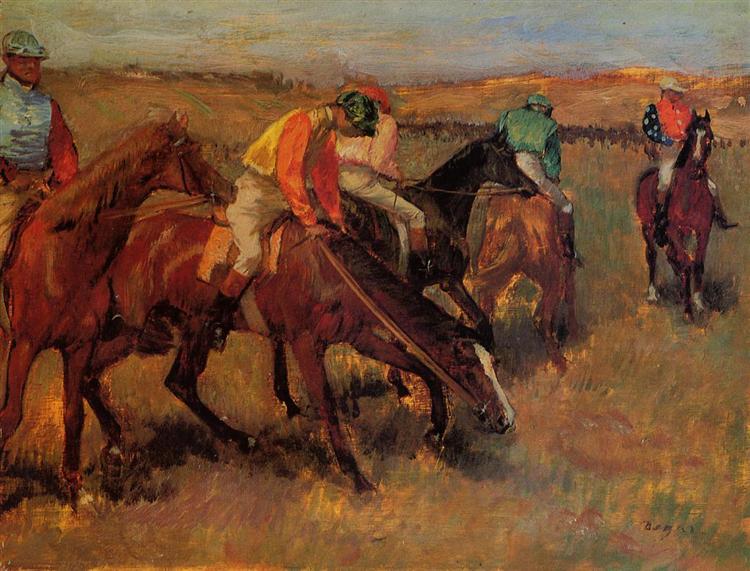Opis
Obraz „przed rasą” (1882) Edgara Degas jest dziełem odzwierciedlającym mistrzostwo artysty w reprezentacji ludzkiej działalności i jego fascynacji ruchem, a także jego poświęcenie się problemom związanym z kręgiem społecznym i działaniami czasowymi twojego czasu. Degas, rozpoznany ze swojej zdolności do przechwytywania ulotnych momentów i subtelnych emocji, wchodzi w świat wyścigów konnych, bardzo popularny temat w paryskim społeczeństwie XIX wieku. Dzięki tej pracy widz jest świadkiem sceny, która łączy zarówno oczekiwanie, jak i przygotowanie.
Skład „przed rasą” jest intrygujący i złożony. Degas używa niezwykłej perspektywy, która pozwala obserwatorowi prawie spojrzeć wśród postaci na scenie, tworząc poczucie bliskości i intymności. Na pierwszym planie wyróżniają się dwie postacie, które wydają się być dżokejami, uchwycając moment przed zawodami. Skoncentrowany wygląd jednego z nich, który jest zamontowany na koniu, sugeruje mieszankę nerwowości i determinacji. Natomiast drugi dżokej stoi, cierpliwie czeka, jego zrelaksowana postawa uzupełnia wyczuwalne napięcie w powietrzu.
Wybór kolorów w tej pracy jest szczególnie niezwykły. Degas używa palety zawierającej zielone tony i ziemie, która przywołuje nie tylko naturę toru wyścigowego, ale także wyrafinowanie wydarzenia. Subtelne warstwy pigmentu, nakładane w luźne pociągnięcia pędzla, ułatwiają żywą atmosferę, która daje życie scenę i wzmacnia delikatność i bezpośredniość chwili. Degas słynie z zdolności, aby figurki wyglądały na prawie unoszące się, technikę, która objawia się tutaj w sposób, w jaki dżokeje wchodzą w interakcje z otoczeniem.
Postacie obrazu, choć nie są identyfikowalnymi indywidualnymi portretami, reprezentują archetyp paryskiej kultury tamtych czasów. Włączenie elementów takich jak koni i drużyna dżokejów podkreśla atrakcję sportu, odzwierciedlając moment przygotowania, który przewiduje konkurencję. Jest to powtarzająca się funkcja w wielu dziełach Degas, w których często oddaje moment przed znaczącym wydarzeniem, albo w tańcu, w teatrze lub, w tym przypadku, w wyścigach koni.
Ponadto „przed wyścigiem” można go interpretować nie tylko jako reprezentacja wydarzenia społecznego, ale także jako medytacja dla osób otaczających to wydarzenie. Degas, w ramach ruchu impresjonistycznego, zakwestionował konwencje akademickiego malarstwa swoich czasów, często obejmując naturalne światło w jego dziełach i skupienie się na współczesnym doświadczeniu. Ta praca, choć zakotwiczona w tradycyjnym wydarzeniu, jest impregnowana nowoczesną estetyką, która nadal rezonuje, pokazując bezpośredniość momentu, w którym wszystko jest oczekiwane.
Warto również dbałość o szczegóły w odzieży dżokejów. Degas podkreśla kolorowe garnitury dżokejów, które nie tylko służą jako charakterystyczne w wyścigach, ale także przyczyniają się do żywycyjnej palety pracy jako całości. Ta uwaga na szczegóły kostiumu odzwierciedla zainteresowanie Degas sztuką wydajności i tożsamości w kręgach społecznych swoich czasów.
Krótko mówiąc, „przed rasą” jest wspaniałym przykładem talentu Edgara Degasa, który uchwycił esencję ulotnego momentu i charakteru jego bohaterów. Dzięki swojej zdolności do manipulowania światłem, perspektywą i kolorem Degas udaje się przekształcić codzienne zdarzenie w bogate i sugestywne doświadczenie wizualne. Ta praca jest nie tylko świadectwem sztuki impresjonistycznej, ale także głębokim odzwierciedleniem społecznej i kulturowej dynamiki swoich czasów, co czyni go fundamentalnym elementem zrozumienia rozwoju sztuki współczesnej.
KUADROS ©, słynna farba na twojej ścianie.
Ręcznie wykonane obrazy olejne, z jakością profesjonalnych artystów i charakterystyczną pieczęcią KUADROS ©.
Usługa reprodukcji zdjęć z gwarancją satysfakcji. Jeśli nie jesteś w pełni zadowolony z repliki twojego obrazu, zwrócimy twoje pieniądze w 100%.

